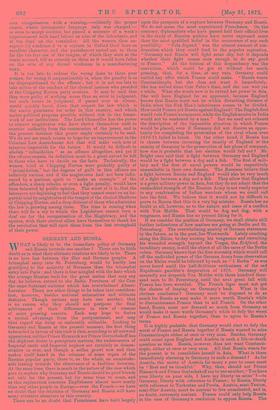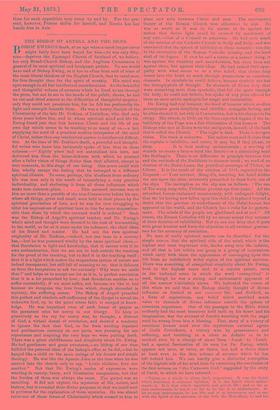GERMANY AND RUSSIA.
WHAT is likely to be the immediate policy of Germany and Russia towards one another ? There can be little doubt as to what their ultimate relations are likely to be. There is no love lost between the Slav and German peoples. A triumphal entry into St. Petersburg would be hardly less gratifying to the majority of Germans than the triumphal entry into Paris ; and there is fear mingled with the hate which the average Russian feels for the great nation that may any day, he believes, extend to the Baltic Provinces of the Czar the same fraternal embrace which has overwhelmed Alsace- Lorraine. There are other things to be taken into considera- tion, however, besides national animosities and ultimate destinies. Though nations may hate one another, that is no reason why they should not postpone the final arbitrament of their differences in view of reasons of more pressing concern. Each may hope to derive a special advantage from the postponement, and may thus regard the delay as eminently utilisable. Looking to Germany and Russia at the present moment, the first thing to be noted in favour of this view is that, according to all outward appearance, neither Prince Bismarck nor Prince Gortschakoff has the slightest desire to precipitate matters, the endearments of Imperial uncle and Imperial nephew are certainly as demon- strative as ever, and though a sullen growl now and then makes itself heard in the columns of some organ of the Russian popular party, there is, on the whole, an unmistake- able leaning towards the observance of a faultless decorum. At the same time, there is much in the nature of the case which goes to explain why Germany and Russia should be good friends not only for the present, but for some time to come, and as this explanation concerns Englishmen almost more nearly than any other people in Europe—even the French—we have no doubt that the relations of Germany and Russia will have many attentive observers in this country.
There can be no doubt that Frenchmen have built largely upon the prospects of a rupture between Germany and Russia. We do not mean the most experienced Frenchmen. On the contrary, diplomatists who have passed half their official lives in the study of Russian politics have never expressed more than the most qualified belief in the occurrence of any such possibility. " Cela depend," was the utmost amount of con- firmation which they could lend to the popular aspiration. "Germany and Russia will fight some day, but it depends whether their fight comes soon enough to do any good to France." At the bottom of this despondency was the conviction, which could be got at without too much pressing, that, for a time, at any rate, Germany could outbid any offer which France could make. "Russia wants Constantinople, but she does not want it immediately. She has waited since Czar Peter's time, and she can wait yet a while. What she wants now is to extend her power in Asia. She will have England for an opponent, because England knows that Russia must not be within disturbing distance of India when the Sick Man's inheritance comes to be divided. How could France aid Russia againstEngland ? The Englishfleet would ruin France's commerce, while the English armies in India would not be weakened by a man." But we need not exhaust the description of the impossible situation in which France would be placed, even if Germany did not discern an oppor- tunity for completing the prostration of the rival whom even 1870-71 failed to break. On the other hand, if Russia has to choose between incurring the enmity of England or the enmity of Germany in the prosecution of her plans of conquest, how was it probable that her election would fall out ? Mr. Bright once said that a fight between Germany and England would be a fight between a dog and a fish. The first of mili- tary and the first of naval powers would be respectively unassailable in their own domain. The Russians believe that a fight between Russia and England would also be very much of a fight between a dog and a fish. They allow that England is a great military power in Asia, but they do not admit that the unshackled strength of the Russian Army is not vastly superior to any combination of Indian warriors whom we could call into the field. We believe that it would not be difficult to prove to Russia that this is a very big mistake. Russia has no doubt at all, however, as to the nature and issue of a conflict with Von Moltke. That would be dog and dog, with a vengeance, and Russia has no present liking for it.
If we consider the position of Germany, we shall obtain still further indications of how matters are going at Berlin and St. Petersburg. The overwhelming anxiety of German statesmen in the future, as in the past, lies Westwards. Lately couching
along the Rhine, to-day nursing his vengeance and recruiting his wounded strength beyond the Vosges, the Erbfdind, the
hereditary enemy, is still the object of all the cares of the Berlin rulers. Germany knows that the first necessity which would call off the undivided power of the German Army from observation on the Rhine would be followed by such an "ii Berlin" as was never heard amid the half-fictitious enthusiasm of the sad Napoleonic gambler's desperation of 1870. Germany will assuredly not despatch Von Moltke with three hundred thou- sand men to St. Petersburg, until the next great fall with France has been wrestled. The French tiger must not get the chance of leaping on Germany's back. What is the obvious conclusion ? Germany must be disposed to do so much for Russia as may make it more worth Russia's while to discountenance France than to aid France. On the other hand, Russia must not demand so much from Germany as would make it more worth Germany's while to defy the worst of France and Russia together, than to agree to Russia's terms.
It is highly probable that Germany would elect to defy the worst of France and Russia together if Russia wanted to seize Constantinople either at once or very soon. Besides, Germany could count upon England and Austria in such a life-or-death question as that. Russia, lrowever, does not want Constanti- nople, either at once or very soon. All that Russia wants for the present is to consolidate herself in Asia. What is there immediately alarming to Germany in such a demand ? As for Austria, the motto of Austria for many a year to come must be "Rest and be thankful." Why, then, should not Prince Bismarck and Prince Gortschakoff say to one another, "Youhave your liberty on your side, I have my liberty on mine"?—to Germany, liberty with reference to France ; to Russia, liberty with reference to Turkestan and Persia. Austria, semi-Teuton,
semi-Slav Austria, must be content to live unmolested, and is, no doubt, extremely content. France could only help Russia in the case of Germany's resolution to oppose Russia. The
time for such opposition may come by and by. For the pre- sent, however, France shifts for herself, and Russia has her hands free in Asia.



































 Previous page
Previous page